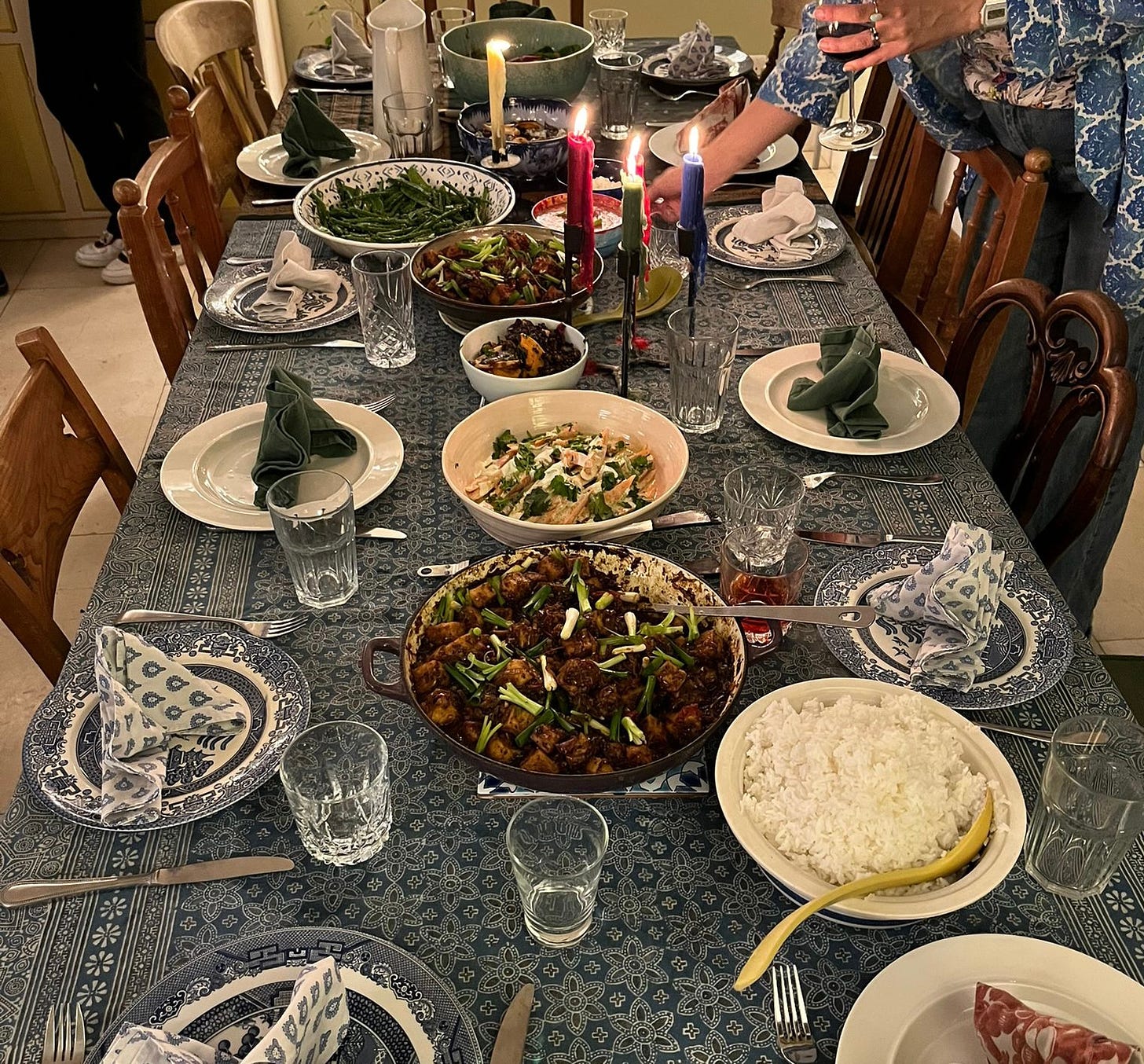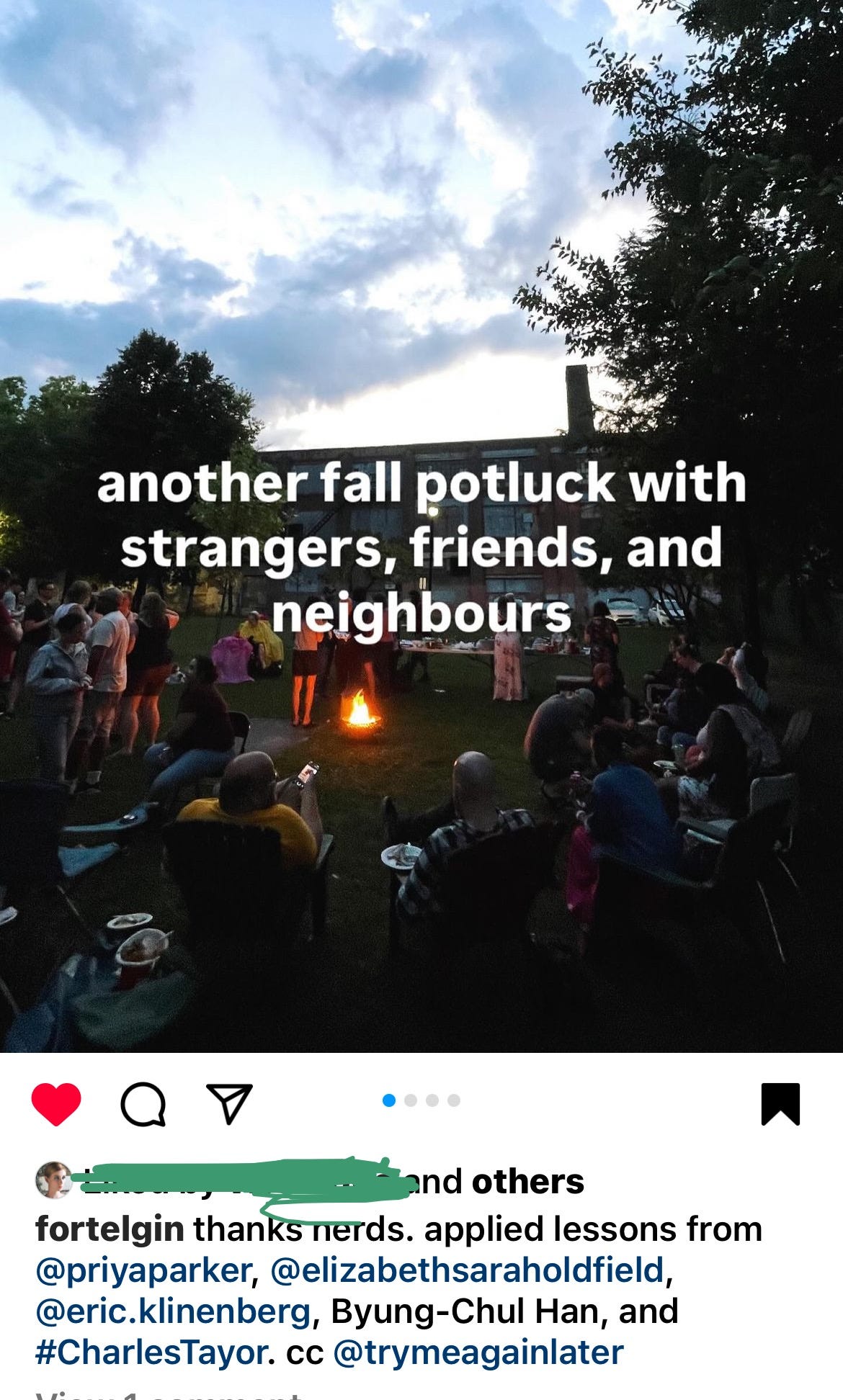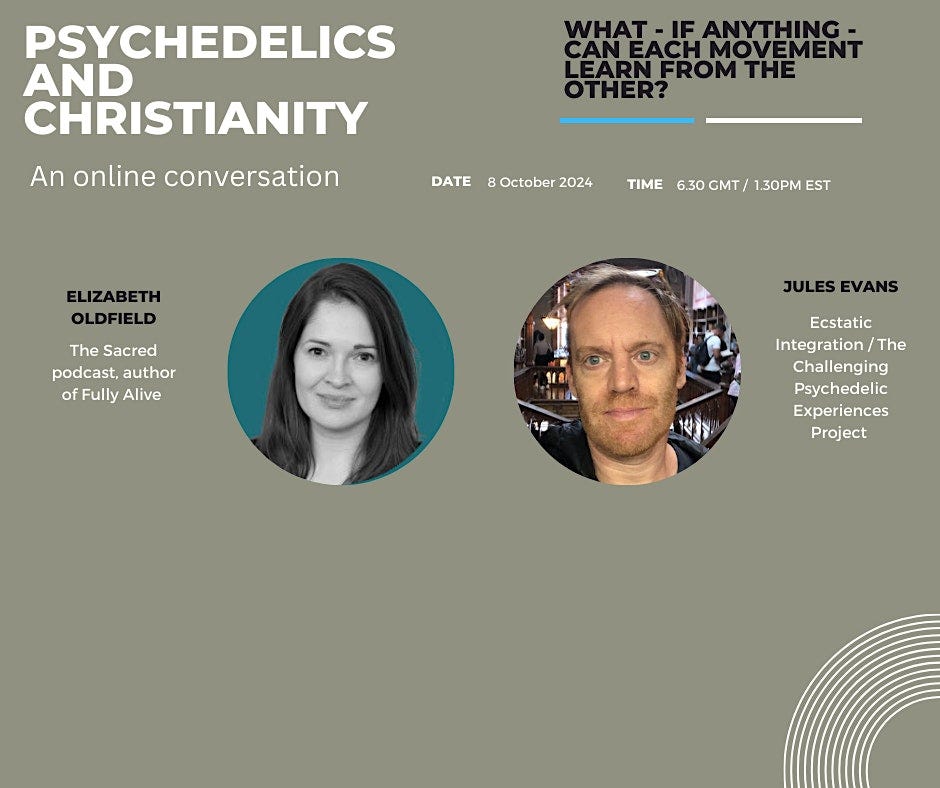Soul work for the ‘end of the world’? Set the table
Plus details of an upcoming event on Psychedelics and Christianity, and other events
Not expecting this newsletter? Well spotted! I usually write fortnightly but it seems I have a lot to say at the moment. Normal service will resume shortly.

Comment Magazine has recently published an adapted extract of Fully Alive. In the rewriting I added a line which became the title for the piece: “my personal soul work for the end of the world”. It is a phrase that has been going around and around in my head for months, but I took a breath when I saw they’d used it, because all this end of the world stuff is divisive.
My friend and Larger Us colleague Alex Evans has just launched his own, excellent substack entitled “The Good Apocalypse Guide” and there was a *lot* of debate about whether the name would be offputting. That we might be living in end times is an inherently triggering thought. I recently had a lovely conversation with
(subscribe to The Sacred to get it when it drops), who has made the somewhat unorthodox journey from being editor of Cosmpolitan Australia, to helping millions of people quit sugar, to essentially chaplaining a huge online community through climate grief and fear. She is more certain than I am that we are heading for collapse (maybe just more courageous), but we explored together what it might mean to let these times make us more fully human, not less.Wherever you land on it, the topic is prone to cause us to tense up, eye roll or call each other names. Are you a “doomer” or a “denier”? Honestly? It depends which day you catch me.
What I do know is that the cultural story about the end of the world is forming me, and I want to be conscious of that. As
points out, this story can’t help but trigger collective anxiety, and that anxiety is making us more divided and dividable. It makes it harder to turn towards each other and get on with work we know needs doing, whatever the future holds. I’m increasingly convinced that a piece of work which looks unsexy, “soft” and low ambition given the scale of the challenges we face may in fact be the most effective thing we can be doing: neighbouring.In the freewheeling conversation with Sarah I kept coming back to a nugget of wisdom from my tradition, written more than two thousand years ago. It’s found in an ancient letter to a small group of underdog outsiders who were also wondering how to live in turbulent times:
The end of all things is near. Therefore be alert and of sober mind so that you may pray. Above all, love each other deeply, because love covers over a multitude of sins. Offer hospitality to one another without grumbling.1.
In rereading recently, it jumped off the page at me. The end of all things is near, therefore love each other and set the table. This posture is the opposite of our standard reaction to that first line. There is no suggestion that the community should dig themselves a bunker or lay in weapons and a decade worth of canned food. That natural self-preservation instinct is subverted into its exact opposite. Scared witless? Knock on your neighbours door. Open your own wide. Budge up there at the back, there is always room for one more.2
It’s so simple, and so human. One translation of “without complaining” could be “Look, I know sharing can be a ballache and people are inherently annoying and also you’re knackered and want to numb out to Netflix but really this is important and you’ll feel better. Maybe keep the bitching to a minimum?”3.
There are solid social scientific reasons to lean into this unromantic “just set the bloody table” energy. Even in ordinary times, investing in our relationships, knowing our neighbours and spending time eating together is good for us. It is how we lived for millennia, are still designed to live today. The root of companion is “eat bread with”. Piles of data show the linkages between social isolation and rising anxiety, ill health and subjective well-being4. Being together, regularly, with our actual bodies, ideally around a table, is a key component in our flourishing.
It is also something we’ve got out of the habit of. As Oliver Burkeman argued in 4000 Weeks, our endless quest for personal autonomy has boiled down to the freedom to never see our friends. We’ve abandoned all the institutions of belonging where we’d reliably run into people without needing a months long scheduling attempt which people keep forgetting to reply to. Social media means too many of us feel they can’t invite people over until the soft furnishings look great and they’ve cooked a photogenic feast. Covid and remote working have glued us into our personal hutches, where endless entertainment is effortlessly at hand to persuade us to stay in, alone and blank eyed.
This is poor timing, because habits of hospitality are not just good for us, they protect us. Communities with preexisting strong social capital fare much better after disasters. One research paper title sums it up: “How we connect determines how we recover”5.
If we are heading for social collapse, the communities which have built strong social bonds (which is just jargon for ones that know their neighbours) are the ones we will all want to be part of. Individualism rapidly loses its appeal in disasters. Sure, we could turn on each other and scrap over scarce resources, but working together and protecting each other is definitely going to turn out better. That is much easier to do if you already know each other’s names, learned to tolerate each other’s foibles. Even better if you trust each other, have developed the habits of reciprocity and mutual care we are going need. We might even find that the creative collaboration required to reimagine a different world births something beautiful in the ruins.
Because of the fancy “social capital” framing of the research, we can think all this means we should launch a non-profit, local business or complex project. Some of that may be brilliant, but it doesn’t have to be so high a bar. All of us can invite someone from our neighborhood to eat with us. Even if we don’t have our own space or access to a kitchen, we can organise a picnic potluck in the park6.

“Just lay the bloody table and open the door” as a spiritual practice for These Times is part of why my family and I moved into a community. We eat together everyday and host regularly, and so I don’t have to think about it. It’s just habit. This urge to is partly driven by fear and selfishness, a maternal protective instinct. I think it is likely to be a more strategic one, though, than the reflex to withdraw and self-protect. It also builds my sense of agency. I don’t need to predict the future, I can do something I know is good for us, either way. I am not someone who can create technical policy solutions or project manage a rapid decarbonisation. If that is you, thank you. All power to your elbow and blessings on your labour. Me? I’m a writer whose skills might be just about to be made redundant by AI. Knowing what I can do in these times can be overwhelming, so I try and keep it simple. Pray, make a tonne of cheap, non-photogenic daal, chip my kids’ dried weetabix off the second hand table with a chisel then invite a bunch of people to dinner. I can get to work weaving the basket of local human relationships which might, just might, keep us afloat. And you know what? It *is* sometimes a ball ache, but it is also, almost always, a joy.
Psychedelics and Christianity: what might they learn from each other?
Earlier in the year
and I invited you to a conversation event which we sadly had to cancel. We’re having another go on 8th October. Jules writes Ecstatic Integration (and brilliant books including The Art of Losing Control and Philosophy for Life and Other Dangerous Situations). He spends a lot of time writing and thinking about the psychedelic revival, including reporting on potential harms. I’ve noted in the last five years ago the ways the increased mainstreaming of psychedelics, both in medical settings and for those seeking transcendence/personal growth, is changing the spiritual landscape. I believe anyone interested in our cultural moment should be paying attention. As a charismatic Christian I’m very comfortable with ecstatic experiences, and have never felt the need to take drugs to achieve them, but I am intrigued by what these two worlds can learn from each other, what the oppurtunies and risks for all our souls might be. Neither of us claim any answers here, but we will be sharing our reflections and experiences and inviting others into the conversation.If you’re already a paid subscriber you will receive the zoom link about a week ahead of time, and be able to access the video of the conversation afterwards. If you’re not, but would like to attend, now is a great time to upgrade. Remember, if the cost of a paid subscription is prohibitive for you, drop me a quick message and I’ll happily comp you one. Otherwise you can buy a ticket here (this won’t include access to the video afterwards).
What else I have been up to, and some other events you can find me at:
I enjoyed this gorgeously produced podcast on the science of spirituality called How God Works.
And also this one (Beauty at Work) about beauty and science.
I’ll be speaking at Wigtown Literary Festival on Friday 4th October (the same day as Cerys Matthews, if you need an incentive to make the trip), interviewed by philosopher (and atheist),
.If you’ve been meaning to try choral evensong, are in reach of London and would like to see a friendly face, I’ll be preaching the 375th annual Lion Sermon at St Katherine Cree in the City of London at 6pm on Thursday 10th October.
I’m giving a lecture as part of a day on The Future of Humanity hosted by Dr Iain McGilchrist on Saturday 26th October.
And sharing a stage with all time hero Rowan Williams, as part of a debate on “God, consciousness and the purpose of life” (gulp) on 15th November (though this has now sold out).
1 Peter 4:7-10
Because it does not say RSVP on the Statue of Liberty. Sorry, Clueless reference. Can’t help it.
Elizabeth Oldfield Version (EOV), from the Greek. (Obviously I am joking I wish that didn’t need saying).
For a place to start: https://www.hhs.gov/about/news/2023/05/03/new-surgeon-general-advisory-raises-alarm-about-devastating-impact-epidemic-loneliness-isolation-united-states.html or here https://www.heyneighbourcollective.ca/2022/06/how-social-connectedness-between-neighbours-supports-health-wellbeing/
https://www.sciencedirect.com/science/article/abs/pii/S0277953622008358
See also https://psycnet.apa.org/record/2019-68126-001, https://www.ncbi.nlm.nih.gov/pmc/articles/PMC10391527/,
It was pure joy to have someone send me this picture on Instagram recently, saying it was partly inspired by Fully Alive.





"cheap, non-photogenic daal" - the manna our moment needs. xx
“Scared witless? Knock on your neighbours door. Open your own wide.”
Beautiful. Thank you for connecting my religious faith to an ethos I’ve always held. 🙏